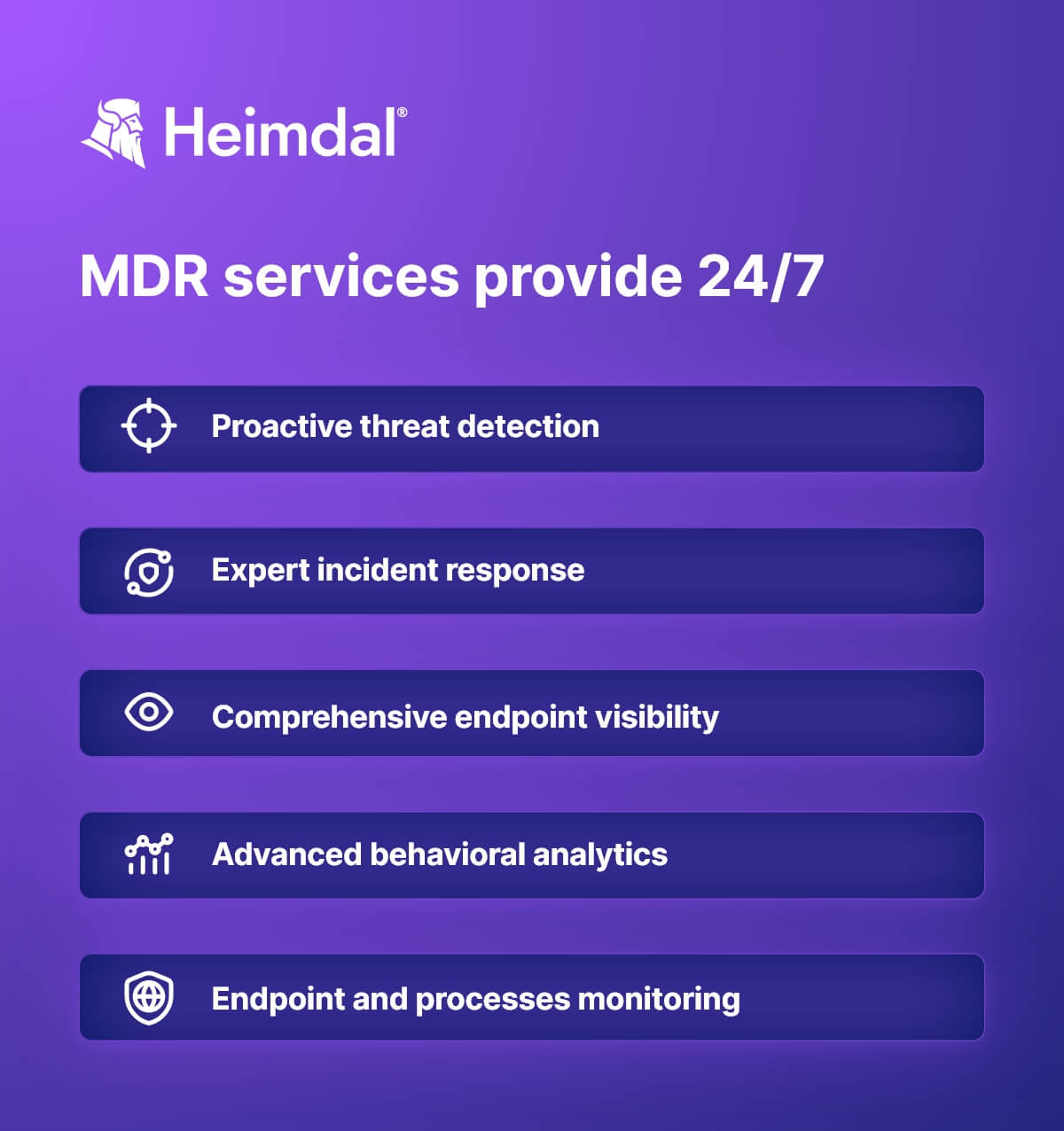Contents:
In the ever-evolving landscape of cybersecurity threats, Managed EDR (MDR) enables organizations worldwide to safeguard their digital assets. During the past years, MDR services have demonstrated effectiveness against a variety of threats: ransomware, supply chain assaults, malware, data exfiltration, and Business Email Compromise (BEC), among others.
Traditional security measures are at times outpaced and turned ineffective by the myriads of newly emerged threats. This is why Managed Endpoint Detection and Response (MDR) became lately a powerful ally in bolstering an organization’s cybersecurity posture.
Managed EDR solutions offer cutting-edge technology, expert knowledge, and continuous and proactive monitoring. However, these are just some of the features they have to offer. With that in mind, in this article, we`ll discover what are the top benefits that enterprises gain when they decide to use managed EDR services.
What Is Managed EDR
Managed EDR (MDR) is a cybersecurity solution offering Endpoint Detection and Response (EDR) services. EDR is a group of integrated endpoint security solutions that brings together threat hunting, data forensics, data analysis, and data collecting. Its aim is to identify threats and stop potential security breaches as soon as possible.
Thus, managed EDR enables organizations to effectively monitor, detect, investigate, and respond to security incidents that may affect their endpoints. Furthermore, it provides the expertise and energy of a complete professional security team, cutting-edge tools, and other resources. In order to cover for all the above, a company would need to develop and sustain in-house at greater costs.
A professional MDR solution provides 24/7:
- proactive threat detection,
- expert incident response,
- full endpoint visibility,
- advanced behavioral analytics,
- and continuous monitoring.

How to Assess a Managed EDR Necessity for Your Organization?
While EDR solutions are proven to be more effective than any traditional antivirus in protecting a company`s endpoints, some might still feel the need to evaluate whether their organization needs managed EDR services. To properly assess that, you should take into consideration the following key factors:
- The security infrastructure, policies, and resources that are specific to the company.
- The size of your company, the sensitivity of the data, and the complexity of your IT environment impact the surface attack.
- The risk profile – Based on industry regulations, threat landscape, and historical security incidents, anticipate how a security breach would affect daily business and the brand image.
- People – How many security professionals are there in your IT team, and how skilled are they? Do they have enough time to threat-hunt and monitor the IT environment in order to protect all assets? How fast will they be able to respond and stop a potential security incident?
- Tools – Cybersecurity solutions are growing in complexity and using an antivirus is definitely not enough anymore. As the threat environment evolved in the past years, so did security tools and policies. How much is your company willing to invest in constantly buying up-to-date technology?
- Endpoint visibility – According to the level of visibility you have into endpoint processes, network connections, and user behavior, how effectively can your IT team detect and investigate suspicious behavior or indicators of compromise?
- Compliance standards – Is your company subject to industry-specific regulations or compliance standards that mandate advanced security measures and specific incident response capabilities? Does your company manage to meet them? What is the cost of finance and human resource input?
It is up to you to find the responses to the questions above, draw the bigger picture and determine the action points.
Managed EDR Top Benefits
Managed EDR offers a variety of benefits to companies that want to enhance their cybersecurity posture.
Before tackling what are the most important benefits of a managed EDR solution, we should make it clear how this varies according to the specific needs of companies.
For small and medium-sized enterprises (SMEs) that usually have limited internal resources and expertise, MDR services provide much-needed access to skilled professionals and advanced security technologies. If using such services, SMEs will be able to bolster their cybersecurity posture without the costs of building an in-house security team.
On the other hand, companies that have a complex IT environment and a large attack surface might appreciate more the access to centralized monitoring and incident response coordination. Full visibility across all assets – endpoints, servers, and networks – is a huge benefit for them.
Also, companies that have access to sensitive information and face strict compliance regulations will prioritize managed EDR benefits differently. Organizations that operate in finance, healthcare, and government need to meet regulatory standards. For those, even more than for other businesses, protecting sensitive data, and being able to enforce proper security measures is critical.
So, while we acknowledge that perspectives may differ, we will further focus on what we`ve observed to be the most important ones:
Less pressure on the internal IT teams
MDR enables a company`s IT team to focus on internal projects meant to support achieving the organization’s business goals. So, using an MDR service will prevent burnout and overcrowding.
Proactive Threat Detection
Managed EDR services provide access to advanced techniques and analytics that enable teams to detect and respond to threats in a timely manner. Early detection of malware and system breaching allows the security specialists to respond faster and mitigate the impact of a security incident.
Expert Incident Response
Instead of having to invest in recruiting or training in-house security professionals, companies can benefit from a crew that is already experienced in incident response. Their continuous training and exposure to the daily evolution of the threat landscape enables them to provide better and swifter incident response. At the end of the day managed EDR pricing turns out to be worth a lot more than setting an equivalent in-house solution.
Extensive Endpoint Visibility
Managed EDR solutions offer full in-depth visibility into endpoint activities. It includes user behavior, network connections, and file changes. Therefore, the solution helps detect anomalous behavior and potential indicators of compromise (IoCs) faster and more accurately. This of course leads to more successful threat hunting and incident investigation.
Continuous Monitoring
24/7 monitoring of endpoints is a must in order to keep a company`s IT environment safe. However, this brings huge pressure on an enterprise`s security team and budget. Constant surveillance is exhausting and might eventually result in alert fatigue. Using a managed EDR service enables real-time response to security incidents, thus preventing or mitigating a system breach. In addition, it keeps burnout away.

- End-to-end consolidated cybersecurity;
- Powered by the Heimdal XDR, Unified Security Platform
- Comprehensive enterprise security without any additional integrations
- 24x7 monitoring & prompt response delivered by our security experts
The Heimdal Solution for Managed EDR
Heimdal’s 24×7 fully Managed Extended Detection & Response (MXDR) system enables you to bolster your cyber defense.
Your company will benefit from an accredited Security Operations Center (SOC) team that will cover event monitoring, threat investigations, extended threat hunting, and forensics.
Heimdal`s MXDR goes beyond monitoring and protecting a company`s endpoints. In addition, our state-of-the-art Extended Threat Protection (XTP) engine offers unmatched real-time visibility across your network, vulnerabilities, endpoints, and emails. It will empower you to be constantly one step ahead of potential attacks due to its predictive AI detection feature.
Wrapping Up
Considering the current threat landscape, using managed EDR services is one of the most inspired decisions a CISO could take to enhance the protection of their company`s IT environment.
As exposed above, managed EDR solutions offer not only proactive threat detection and expert incident response, but also full endpoint visibility, advanced behavioral analytics, around-the-clock monitoring, and enhanced compliance.
Choosing such services bolsters the organization’s capacity to mitigate risks and respond effectively to security incidents. Additionally, managed EDR services provide all that at a more convenient cost and performance than any in-house solution would do.
If you liked this article, follow us on LinkedIn, Twitter, Facebook, and YouTube for more cybersecurity news and topics.










 Network Security
Network Security
 Vulnerability Management
Vulnerability Management
 Privileged Access Management
Privileged Access Management  Endpoint Security
Endpoint Security
 Threat Hunting
Threat Hunting
 Unified Endpoint Management
Unified Endpoint Management
 Email & Collaboration Security
Email & Collaboration Security







